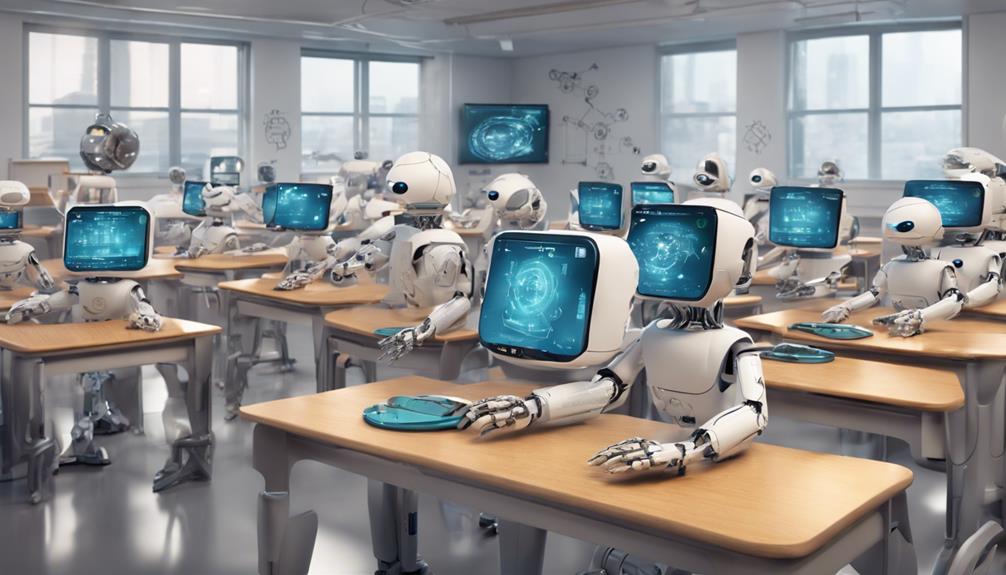Artificial intelligence is rapidly changing the job market in various industries, from customer service to graphic design. Automation is significantly impacting traditional roles as technology advances.
As AI continues to evolve, its potential to replace human jobs raises questions about the future of work and the skills needed to navigate this shifting landscape. In examining the ten examples of AI replacing human jobs today, it becomes clear that adaptation and upskilling are essential for individuals seeking to thrive in an AI-driven economy.
Key Takeaways
- AI revolutionizes customer service with instant responses and personalized interactions.
- Transportation sees automation with autonomous vehicles replacing human drivers.
- Programming evolves as AI automates coding tasks, reshaping roles and raising job loss concerns.
- Automation in coding workflows improves efficiency, requiring programmers to adapt to new skill sets.
Customer Service
How is AI revolutionizing the customer service industry by replacing human roles with automation and chatbots?
AI technology is fundamentally transforming the way companies interact with their customers. By employing AI-driven chatbots and virtual assistants, businesses can now provide instant responses to customer inquiries, significantly enhancing the overall customer service experience. This shift towards automation not only streamlines processes but also reduces operational costs for companies, making it a cost-effective solution for handling customer interactions.
As AI continues to advance, its impact on the customer service sector is becoming more pronounced. The traditional role of human customer service representatives is gradually being replaced by AI-powered solutions that offer 24/7 support and personalized interactions. Consequently, the demand for human workers in customer service roles is decreasing as companies opt for efficient and AI-driven customer service alternatives.
Car and Truck Driver
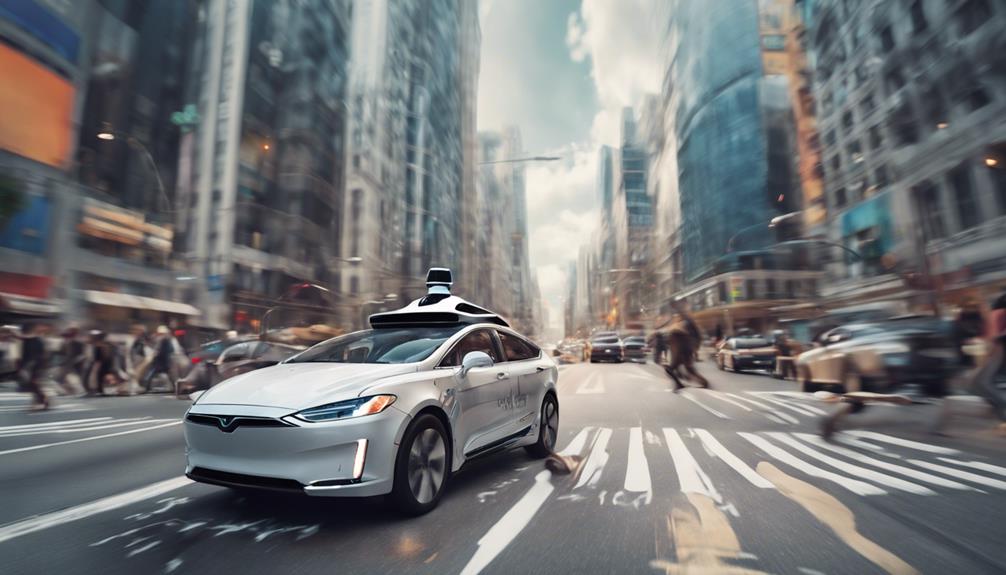
With the rise of autonomous vehicles and advancements in self-driving technology, the role of car and truck drivers is undergoing significant transformation in the transportation industry. This shift towards automation is reshaping traditional driving jobs and raising concerns about job security among human drivers. Companies like Tesla and Waymo are at the forefront of developing AI algorithms for self-driving vehicles, which are gradually reducing the need for human intervention behind the wheel. Self-driving trucks, currently in testing phases for long-haul transportation, aim to improve efficiency and safety on the roads. The transportation industry, once heavily reliant on human drivers, is now embracing autonomous vehicles to streamline delivery services and enhance overall operations.
3 Ways Autonomous Vehicles Impacting Car and Truck Drivers:
- Job Displacement: AI-driven autonomous vehicles are displacing human drivers, raising questions about the future of traditional driving jobs.
- Safety Concerns: The adoption of self-driving technology brings about safety concerns and regulatory challenges in the transportation industry.
- Efficiency Gains: Autonomous vehicles promise increased efficiency in transportation operations, potentially revolutionizing the way goods are delivered.
Computer Programmer
AI advancements in coding are reshaping the traditional roles of computer programmers by automating tasks and accelerating processes. This shift raises questions about the impact on the job market, emphasizing the need for programmers to adapt to changing skill requirements in light of AI's increasing presence in the industry.
As automation continues to evolve, the debate between speed and quality in coding tasks becomes a focal point for professionals navigating the changing landscape of computer programming.
Impact on Job Market
The job market for computer programmers is undergoing significant transformation due to the increasing automation of coding tasks by generative AI tools like ChatGPT. This shift is causing concerns about job losses and the future of work in the programming industry.
Three key points to consider are:
- Rapid Automation: AI tools are rapidly automating coding tasks, potentially leading to job displacement among computer programmers.
- Global Impact: With AI projected to replace 85 million jobs globally by 2025, the role of computer programmers is not immune to this wave of automation.
- Quality vs. Speed: The balance between speed and quality in programming tasks is being redefined by AI, impacting the skill sets required in the job market for computer programmers.
Automation in Coding
The evolution of generative AI tools like ChatGPT is fundamentally reshaping the landscape of coding tasks, particularly impacting the traditional role of computer programmers. ChatGPT, an AI-powered tool, is automating parts of the coding process, enhancing efficiency but also raising concerns about the trade-off between speed and quality in programming.
This automation in coding tasks is transforming how computer programmers work, introducing new levels of automation and efficiency into their workflows. As AI tools like ChatGPT continue to advance, they have the potential to streamline coding processes further, potentially reducing the need for human programmers in certain tasks.
This shift towards automation in coding signifies a significant change in the skill sets required for programmers, necessitating adaptation to these technological advancements.
Skills Needed for AI
Demonstrating proficiency in coding languages such as Python, Java, and C++ is crucial for computer programmers navigating the AI-driven job market. To thrive in this field, programmers must possess a deep understanding of algorithms, data structures, and software development principles.
Additionally, expertise in machine learning techniques and frameworks like TensorFlow and scikit-learn is highly valuable. Staying updated on AI trends, tools, and technologies is paramount for remaining competitive.
Moreover, soft skills such as collaboration and communication are essential for effectively working on AI projects and within teams. In the realm of AI writing, programmers need to blend their technical prowess with a human touch, emphasizing critical thinking and a foundation in data science.
Research Analyst
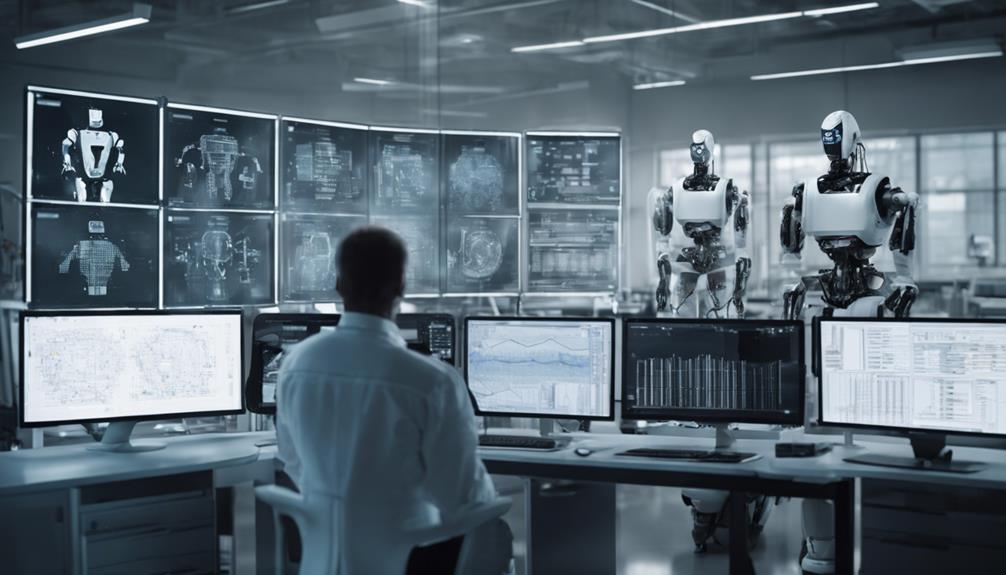
How is AI reshaping the role of research analysts in today's industry landscape? Research analysts are seeing a transformation in their traditional roles due to the increasing integration of AI and automation tools. AI technologies, such as predictive analytics models, are revolutionizing data analysis processes, potentially leading to job replacements in this field. The ability of AI to swiftly process vast amounts of data and generate actionable insights is challenging the conventional responsibilities of human research analysts. This shift towards automation is redefining the industry standards, necessitating a new skill set for professionals in this domain.
| Aspect | Impact |
|---|---|
| Data Analysis | AI efficiently processes data |
| Job Replacement | AI jeopardizes research analyst roles |
| Predictive Analytics | AI models generate insights |
Paralegal

With the rise of AI technologies revolutionizing various industries, the role of paralegals is undergoing significant transformation as automation tools increasingly handle tasks traditionally performed by human workers. AI is automating tasks like document review and contract analysis in the legal sector, once the domain of paralegals. Legal firms are leveraging AI tools to streamline processes, leading to improved efficiency.
The capability of AI to handle large volumes of data and repetitive tasks more quickly than human workers is reshaping the landscape of the legal profession. Paralegals now find themselves in a position where they need to adapt their skills to effectively collaborate with AI tools. This transformation brought about by AI is not about replacing paralegals but enhancing their capabilities and changing the nature of their work in the legal field.
The evolving role of paralegals highlights the necessity for professionals in the legal sector to embrace AI as a tool for augmenting their expertise.
Factory or Warehouse Worker
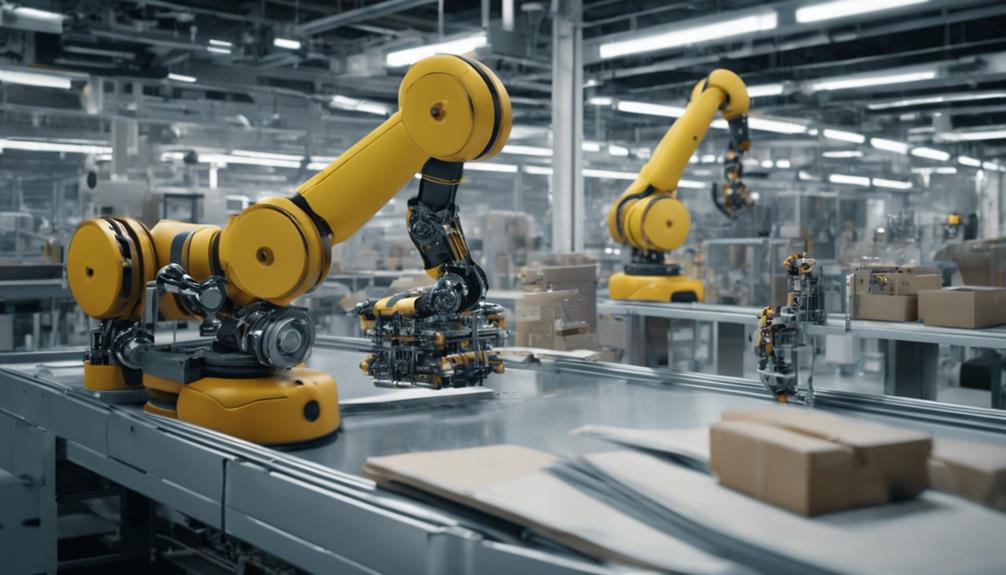
The automation of factories and warehouses through the utilization of robots and AI technologies is significantly impacting the roles traditionally held by human workers in industries such as manufacturing and logistics. AI-powered machines are increasingly taking over tasks like picking, packing, and sorting in warehouses, while companies like Amazon have implemented robotic systems to enhance efficiency and reduce labor costs in their fulfillment centers. Advanced AI technologies such as computer vision and machine learning are enabling robots to perform complex tasks that were once the domain of human workers.
This shift towards automation in factories and warehouses is leading to job displacement for many factory and warehouse workers who used to perform manual labor roles. As robotics continue to evolve and improve, the trend of replacing humans with machines in these settings is expected to accelerate. Workers in these industries will need to adapt by acquiring new skills to remain relevant in an increasingly automated workforce.
Financial Trader

AI algorithms have become increasingly prevalent in the realm of financial trading, revolutionizing the speed and efficiency with which market decisions are made. High-frequency trading firms heavily rely on AI to execute trades at lightning speed, leveraging market data to capitalize on fleeting opportunities.
The impact of AI in financial trading can be summarized as follows:
- Efficiency: AI-powered trading systems can process vast amounts of market data in real-time, enabling rapid analysis and execution of trades, surpassing the capabilities of traditional traders.
- Concerns: The rise of AI in financial trading has raised concerns about market manipulation, as these algorithms can act on information and execute trades faster than human traders, potentially distorting market dynamics.
- Industry Transformation: The integration of AI in financial trading is reshaping the industry by automating tasks and optimizing trading strategies, challenging the role of traditional traders and prompting them to adapt to this new technological landscape.
Travel Advisor
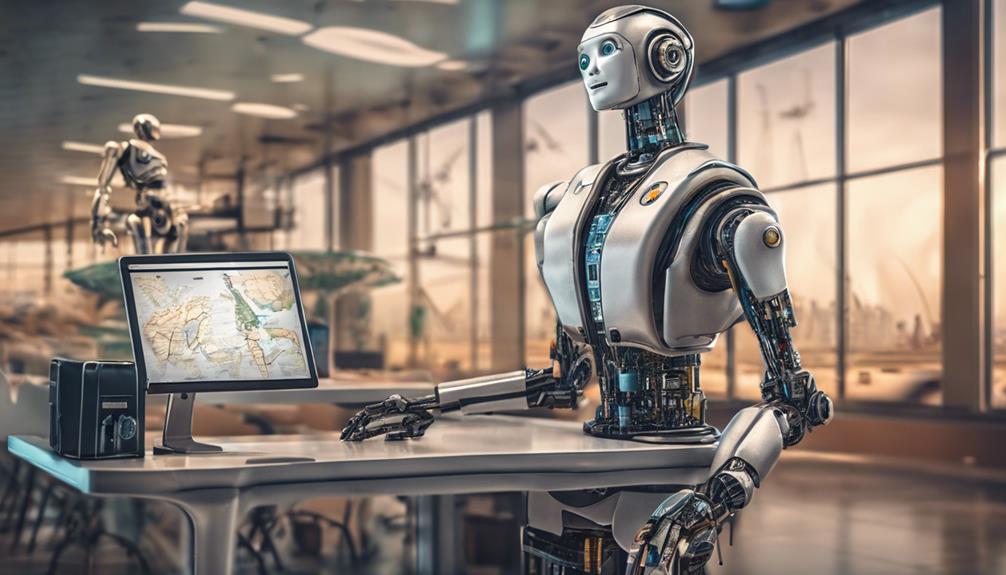
The Evolution of Travel Advisory Services Reflects a Shift Towards AI-powered Solutions for Enhanced Customer Experience.
Online travel platforms such as Expedia and Booking.com are leveraging AI algorithms to offer personalized travel recommendations, catering to individual preferences and needs.
AI-powered chatbots are increasingly taking on the role of handling customer inquiries and managing bookings for travel agencies, providing efficient and round-the-clock assistance.
Google Flights utilizes predictive tools and AI technology to suggest optimal flight options based on user-specific criteria, streamlining the booking process.
Virtual travel agents, powered by AI, are readily accessible to assist customers in planning and booking trips, offering tailored recommendations and enhancing the overall travel experience.
This integration of AI in the travel industry not only improves trip planning and booking services but also ensures prompt and effective customer support, showcasing the potential of AI to revolutionize the travel advisory sector.
Content Writer

The advent of AI-driven writing tools like ChatGPT has revolutionized content creation by offering advanced writing style algorithms that mimic human writers. These tools enable automated content generation at a scale and speed unattainable by traditional methods, raising concerns about the future of human content writers.
Additionally, AI tools like ChatGPT excel at SEO optimization, potentially displacing human writers in tasks requiring keyword-specific content tailoring.
Writing Style Algorithms
Writing style algorithms like ChatGPT are revolutionizing the landscape of content creation. They present a significant challenge to traditional writing roles.
- Disruption in Writing Industry: AI tools such as ChatGPT are reshaping content creation. This could potentially alter the hiring landscape for writers.
- SEO Optimization: Companies like Buzzfeed leverage ChatGPT for SEO-optimized content. This indicates a shift towards AI-driven strategies.
- Efficiency Impact: ChatGPT's ability to produce tailored content swiftly could lead to reduced hiring in writing and ghostwriting fields.
As AI continues to advance, the role of human writers may evolve. This emphasizes the need for adaptability and skill enhancement in an increasingly automated content creation environment.
Automated Content Creation
With the rise of advanced AI technologies like ChatGPT reshaping the content creation landscape, the role of traditional writers faces unprecedented challenges in the realm of automated content creation. ChatGPT poses a significant threat to writing jobs, as it can generate SEO-optimized content and cater to specific keywords more effectively than humans. This automated content creation tool not only streamlines the writing process but also ensures high-quality outputs. Companies like Buzzfeed have already recognized the potential of AI in content creation, leading to stock surges upon implementing ChatGPT. As AI continues to advance, the demand for human writers in fields such as writing and ghostwriting is expected to decline, signaling a shift towards automated solutions.
| AI | ChatGPT | Content Creation |
|---|---|---|
| SEO-optimized | Automated | Writing jobs |
SEO Optimization Tools
Utilizing advanced AI tools such as ChatGPT has revolutionized the process of SEO optimization in content writing, enhancing efficiency and effectiveness in tailoring content to specific keywords. This shift towards AI-driven SEO optimization tools like ChatGPT is evident in companies like Buzzfeed, which are leveraging these technologies for content creation.
The ability of AI, such as ChatGPT, to generate SEO-optimized content at scale and with precision is reshaping the traditional landscape of writing jobs. As businesses increasingly adopt AI for SEO optimization, the dynamics of hiring in the content creation field may undergo significant changes. The impact of AI on SEO writing is not just about improving outcomes but also about redefining the roles and skills required in the industry.
3 Ways AI in SEO Optimization Evokes Change:
- Efficiency: AI tools streamline content optimization processes.
- Precision: AI enhances keyword targeting accuracy for better SEO performance.
- Disruption: AI integration may challenge the conventional hiring practices in content writing.
Graphic Designer

The role of graphic designers is being significantly impacted by the integration of AI tools, such as Adobe Photoshop's Generative Fill feature, revolutionizing the efficiency and productivity of design tasks. Generative AI, a subset of artificial intelligence, plays a pivotal role in streamlining graphic design processes by automating repetitive tasks and offering innovative solutions. These AI tools enable designers to focus more on strategic and creative aspects of their work, freeing up time that would otherwise be spent on manual labor.
While AI tools excel at generating high-quality designs quickly, human creativity remains essential in graphic design. Designers are still responsible for conceptualizing ideas, making critical decisions, and infusing projects with originality and innovation. AI serves as a valuable assistant, enhancing the capabilities of graphic designers rather than entirely replacing them. Ultimately, the integration of AI in graphic design empowers professionals to deliver more impactful and creative solutions, elevating the industry as a whole.
Frequently Asked Questions
What Kind of Jobs Is AI Replacing?
AI is replacing jobs across various industries, including customer service, transportation, programming, research analysis, and legal support. Automation through AI technologies is streamlining tasks traditionally performed by humans, leading to concerns about workforce displacement and the need for upskilling.
How Will AI Replace Human Work?
AI will replace human work by automating tasks through advanced algorithms and machine learning. As technology evolves, AI will streamline processes, enhance efficiency, and potentially replace roles in customer service, transportation, coding, research analysis, and administrative tasks.
How Many Jobs Lost Due to Ai?
The potential job loss due to AI is significant, with projections indicating 85 million jobs globally may be replaced by 2025. In the U.S., approximately 40 million jobs were lost during the pandemic, with 42% possibly not returning.
What Are Some Examples of AI Taking Over the World?
AI's increasing integration is transforming industries. From automating customer service to streamlining coding tasks and financial analysis, AI's impact is profound. As technology advances, jobs like customer service representatives, programmers, and research analysts face potential disruptions.
Conclusion
In the ever-evolving landscape of AI integration in various industries, the gradual replacement of human jobs by automation continues to reshape the workforce. Like a relentless tide, AI's efficiency and accuracy sweep away traditional roles, challenging workers to adapt and innovate in order to stay relevant.
The transformation of job roles is akin to a symphony of change, with AI orchestrating a new era of productivity and efficiency.




